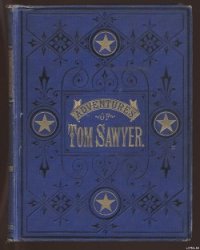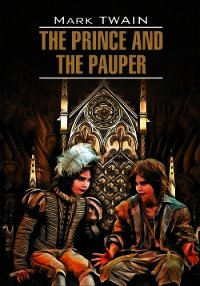Английский язык с Марком Твеном. Принц и нищий (Mark Twain. The Prince and the Pauper) - Twain Mark (читать хорошую книгу полностью .txt) 📗
superstitious [su:p?`st???s], society [s?`sa??t?], melancholy [`mel?nk?l?]
The king was cordially ashamed of himself for having gotten all that fright and misery out of so paltry a matter as a slumbering calf; but he need not have felt so about it, for it was not the calf that frightened him but a dreadful non-existent something which the calf stood for; and any other boy, in those old superstitious times, would have acted and suffered just as he had done.
The king was not only delighted to find that the creature was only a calf, but delighted to have the calf's company; for he had been feeling so lonesome and friendless that the company and comradeship of even this humble animal was welcome. And he had been so buffeted, so rudely entreated by his own kind, that it was a real comfort to him to feel that he was at last in the society of a fellow-creature that had at least a soft heart and a gentle spirit, whatever loftier attributes might be lacking. So he resolved to waive rank and make friends with the calf.
While stroking its sleek, warm back — for it lay near him and within easy reach — it occurred to him that this calf might be utilized in more ways than one. Whereupon he rearranged his bed, spreading it down close to the calf; then he cuddled himself up to the calf's back, drew the covers up over himself and his friend, and in a minute or two was as warm and comfortable as he had ever been in the downy couches of the regal palace of Westminster.
Pleasant thoughts came at once; life took on a cheerfuler seeming. He was free of the bonds of servitude and crime, free of the companionship of base and brutal outlaws; he was warm, he was sheltered; in a word, he was happy. The night wind was rising; it swept by in fitful gusts that made the old barn quake and rattle, then its forces died down at intervals, and went moaning and wailing around corners and projections — but it was all music to the king, now that he was snug and comfortable; let it blow and rage, let it batter and bang, let it moan and wail, he minded it not, he only enjoyed it. He merely snuggled the closer to his friend, in a luxury of warm contentment, and drifted blissfully out of consciousness into a deep and dreamless sleep that was full of serenity and peace. The distant dogs howled, the melancholy kine complained; and the winds went on raging, whilst furious sheets of rain drove along the roof; but the majesty of England slept on undisturbed, and the calf did the same, it being a simple creature and not easily troubled by storms or embarrassed by sleeping with a king.
CHAPTER XIX (Глава девятнадцатая)
WHEN the king awoke in the early morning (когда король проснулся ранним утром; to awake — просыпаться), he found that a wet but thoughtful rat (он обнаружил, что одна мокрая, но сообразительная крыса) had crept into the place during the night (забралась в помещение в течение ночи; to creep — ползти) and made a cozy bed for itself in his bosom (и устроила уютную постельку для себя у него на груди). Being disturbed now (будучи потревоженной теперь), it scampered away (она улизнула). The boy smiled, and said (мальчик улыбнулся и сказал), 'Poor fool, why so fearful (бедная глупышка, почему такая боязливая)? I am as forlorn as thou (я так же несчастен, как ты). 'Twould be a shame in me (было бы стыдно мне) to hurt the helpless (обижать беззащитную), who am myself so helpless (кто сам так беззащитен). Moreover (более того), I owe you thanks for a good omen (я обязан тебе благодарностью за хорошее предзнаменование); for when a king has fallen so low (ибо когда король пал так низко; to fall — падать) that the very rats do make a bed of him (что даже крысы делают постель из него; very — (тот) сам(ый)), it surely meaneth (это точно означает) that his fortunes be upon the turn (что его судьба на повороте = должна скоро перемениться), since it is plain he can no lower go (так как ясно, что он не может пасть ниже).'
He got up (он встал; to get up — вставать) and stepped out of the stall (и вышел из стойла; to step — ступать), and just then (и прямо тогда) he heard the sound of children's voices (он услышал звук детских голосов; to hear — слышать). The barn door opened (дверь сарая открылась) and a couple of little girls came in (и пара маленьких девочек вошла внутрь). As soon as they saw him (как только они увидели его) their talking and laughing ceased (их разговор и смех прекратились), and they stopped and stood still (и они остановились и встали неподвижно), gazing at him with strong curiosity (уставившись на него с сильным любопытством); they presently began to whisper together (они вскоре начали шептать вместе = перешептываться,) then they approached nearer (затем они подошли ближе), and stopped again to gaze and whisper (и остановились снова, чтобы глазеть и шептаться). By and by they gathered courage (постепенно они набрались смелости) and began to discuss him aloud (и начали обсуждать его вслух). One said (одна сказала):
'He hath a comely face (у него привлекательное лицо).'
The other added (вторая добавила):
'And pretty hair (и прелестные волосы).'
'But is ill clothed enow (но плохо одет достаточно).'
'And how starved he looketh (а каким голодным он выглядит).'
They came still nearer (они подошли еще ближе), sidling shyly around and about him (топчась застенчиво вокруг него), examining him minutely (изучая его подробно) from all points (со всех точек), as if he were some strange new kind of animal (как если бы он был каким-нибудь странным новым видом животного; to be — быть); but warily and watchfully the while (но опасливо и зорко в то же время), as if they half feared (как если бы они наполовину боялись) he might be a sort of animal (что он мог бы быть неким видом животного) that would bite (которое может укусить), upon occasion (при случае). Finally they halted before him (наконец они остановились перед ним), holding each other's hands for protection (держа друг друга за руки для защиты; each other — друг друга), and took a good satisfying stare (и взяли хороший удовлетворяющий взгляд) with their innocent eyes (своими невинными глазами); then one of them plucked up all her courage (затем одна из них собрала всю свою смелость) and inquired with honest directness (и спросила с честной прямотой):
'Who art thou, boy (кто ты, мальчик)?'
'I am the king (я король),' was the grave answer (был важный ответ).
The children gave a little start (дети слегка вздрогнули; start — вздрагивание, рывок), and their eyes spread themselves wide open (и их глаза раскрылись сами широко) and remained so (и оставались такими) during a speechless half-minute (в течение безмолвной полминуты). Then curiosity broke the silence (затем любопытство нарушило тишину; to break — ломать):
'The king (король)? What king (какой король)?'
'The king of England (король Англии).'
The children looked at each other (дети посмотрели друг на друга) — then at him (затем на него) — then at each other again (затем друг на друга снова) — wonderingly, perplexedly (недоумевающе, озадаченно) — then one said (затем одна сказала):
'Didst hear him, Margery (ты слышала его, Марджери)? — he saith he is the king (он говорит, что он король). Can that be true (может ли это быть правдой; true — истинный)?'
'How can it be else but true, Prissy (как может это быть иным, нежели правдой, Присси)? Would he say a lie (сказал ли бы он ложь)? For look you, Prissy (потому что смотри, Присси), an it were not true (если бы это не было правдой), it would be a lie (это была бы ложь). It surely would be (это точно была бы /ложь/). Now think on't (теперь поразмысли над этим; on’t = on it). For all things that be not true, be lies (ибо все вещи, которые не правдивы, суть ложь) — thou canst make naught else out of it (ты не можешь сделать ничего другого из этого = с этим уж ничего не поделаешь).'




